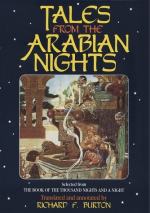This Ms. was copied in Parts on European paper at the beginning of the century, though Caussin de Perceval was not acquainted with it in 1806, but only with a Ms. of the Egyptian redaction. This Ms. agrees with Galland’s only as far as the 69th Night. It differs from it in two other points; it contains No. 1c, and the end of No. 3 coincides with the end of Night 69. The contents of Nights 70-1001 are as follows: 246, 4, 5, 6, 20, 7, 153, 21, 170, 247, The Unhappy Lover confined in the Madhouse (probably = 204c), 8, 191, 193,174, 9, 9b (not 9a, or 9aa) and as episodes, 155, 32, and the story of the two brothers ’Amir and Ghadir, and their children Djamil and Bathina.
Another Ms., used by Chavis and Cazotte, and Caussin de Perceval, was written in the year 1772. It has hitherto been overlooked, because it was erroneously stated in the late M. Reinaud’s Catalogue to be a Ms. containing part of the 1001 Nights, extending from Night 282 to Night 631, and copied by Chavis. It is not from Chavis’ hand, and does not form part of the ordinary version of the Nights, but contains the following tales: 174, 248, Story of King Sapor, 246, 3a, 36, 3c, 153, Story of the Intendant, the Interpreter, and the Young Man; 247, 204c, 240, 250, Story of the Caliph and the Fisherman (probably = 156), the Cat and the Fox, and the Little Bird and the Fowler.
Another Ms., really written by Chavis, commences exactly where Vol. 3 of Galland’s Ms leaves off, i. e. in the middle of No. 21, and extends from Night 281 to Night 631. M. Zotenberg supposes it to have been written to supply the place of the last volume of Galland’s set. It contains the following tales in addition to the conclusion of No. 21: 170, 247, 204c, 8, 191, 193 and 174. M. Zotenberg suggests that the first part of this Ms may have been copied from Galland’s last volume, which may have existed at the time in private hands.
The two last MSS. contain nearly the same tales, though with numerous variations.
M. Zotenberg discusses the hypothesis of Chavis’ Ms. being a translation from the French, and definitely rejects it.
[Section V.]—Here M. Zotenberg discusses the MSS. of the Nights in general, and divides them into three categories. 1. MSS. proceeding from Muslim parts of Asia. These, except the MSS. of Michael Sabbagh and that of Chavis, contain only the first part of the work. They are all more or less incomplete, and stop short in the middle of the text. They are not quite uniform, especially in their readings, but generally contain the same tales arranged in the same order. Ii. Recent MSS. of Egyptian origin, characterised by a special style, and a more condensed narrative; by the nature and arrangement of the tales, by a great number of anecdotes and fables; and by the early part of the work containing the great romance of chivalry of King Omar Bin Al-Nu’uman. III. MSS. mostly of Egyptian origin, differing as much among themselves in the arrangement of the tales as do those of the other groups.




